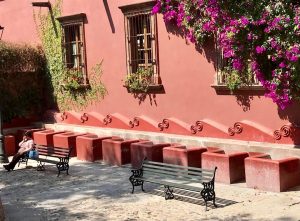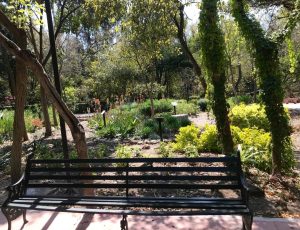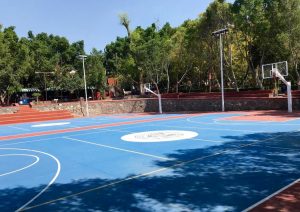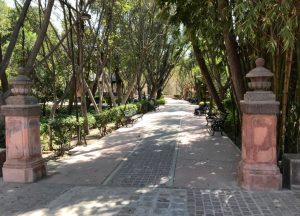Last week, on a particularly dazzlingly bright and sunny Saturday afternoon, I decided to return to my former neighborhood near my beloved Parque Benito Juarez here in San Miguel de Allende to visit some of the familiar faces I used to know there. It’s a long walk, but I was up to it. I wanted to know how they were faring in this pandemic.
In the courtyard by Los Lavaderos, the once-public laundry on the corner of Recreo and Santa Elena, a stone’s throw from the park, I stopped to say hello to a sweet man I used to greet every day on my walks to the park when I lived there. This middle-aged man, shortish and stocky as many Mexican men tend to be, makes his living selling decorative, hammered-tin objects – such as candlesticks, angels, many-pointed stars, mirrors and picture frames – to tourists.
In the nine months since I moved away, my Spanish-language skills have improved a bit, so I thought he and I might be able to converse, really for the first time.

He appeared genuinely happy to see me again. He asked where I’d been, and I explained I now live in Colonia Guadalupe – “una distancia,” I said, waving my arm in that general direction – and my daily walks now take me to Parque Zeferino, nearer where I live. When I asked how things were going for him, he smiled a wan smile and shrugged a little. “Más o menos” (more or less), he said bravely. But I could tell it was more like menos.
Inside Parque Juarez, the 100-plus-year-old jewel of a city park that’s been entirely refurbished in recent years, I saw that only two artists had set up their paintings against a long retaining wall. In pre-COVID days, Saturdays became outdoor art exhibitions in this park, with dozens of Mexican artists showing their work for the pleasure of – and, with luck, purchases by — passersby. Sadly, not now.
One of those two, whose name I knew – Carlos – waved to me and smiled in recognition, so I stopped to talk with him in Spanish too. When I asked how business was going for him, he answered matter-of-factly, “Ahora no mucha gente” (not many people now). His handsome face expressed neither anger nor defeat, but rather: this is life.
It was a good thing I was wearing a face mask and large dark sunglasses because they hid my tears. As I walked away from Carlos, in the dappled sunlight filtering through the 100-year-old trees, past empty park benches and the unused basketball courts and the silent kiddie playground, I began to cry.


This, now, is the tourist season in a city dependent on tourism for its lifeblood. But because of the pandemic, one sees very few foreign tourists here these days, and next to none of the usual American and Canadian snow birds here for the winter.
The Candelaria plant-and-flower fair, which used to transform Parque Juarez into a huge colorful garden when nurseries from all over Mexico brought plants, pots, and flowers for display and sale during the first half of February every year, is not happening this year.
The renown San Miguel Writers Conference, which has attracted thousands of writers and book lovers to this city from all over the world at this time of year for 15 years, is also not happening as such. The events are all online now. (Go to www.sanmiguelwritersconference.org for more details.)
I have no doubt that the municipal government is doing its best to deal with the pandemic, and I’ve observed that most locals are following the rules with characteristic patience and endurance. Despite this, it appears to me, as an outsider, that the people are hurting. It’s beginning to show.
And more and more people are dying. As I write this, the number of people who have died from the coronavirus here in San Miguel since last March has reached 156. Just this week I learned that a friend’s favorite doctor died of COVID; the owner of a much-loved store, San Miguel Shoes, died of COVID; and a radio personality on the local station, a voice that came into everyone’s homes, has been silenced by COVID.
These are strange and strained times for everyone, everywhere. I feel fortunate, though, to be old now and retired, living on a small but steady monthly Social Security income. I feel deeply grateful to be a permanent resident of this beautiful old colonial city in this sunny, embracing, affordable country. I feel indebted to Mexico for a new lease on life. And I would urge my fellow-expats to feel the same.
We gringos, who I maintain should behave as respectful guests in this country, must not, I feel, isolate ourselves in our comfy cocoons, remaining glued to the news on our computers or TV screens all day, to the point where we are blind to the current struggles of the Mexicans living all around us. We must, I believe, go out for walks (wearing a mask, of course), to stretch not only our legs but also our hearts and our minds, to open our eyes to this grave situation on the ground, and then do whatever we can, whatever is within our individual power, to help.

~ ~ ~ ~ ~ ~
I invite WOW readers to share in the Comments section their specific thoughts and suggestions on HOW we might help.
